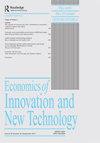除了生产力之外,农业技术的采用是否改善了粮食消费并减少了贫困?贝宁的经验证据
IF 3.2
3区 经济学
Q1 ECONOMICS
引用次数: 1
摘要
本文章由计算机程序翻译,如有差异,请以英文原文为准。
Beyond productivity, does the adoption of agricultural technologies improve food consumption and reduce poverty? Empirical evidence from Benin
求助全文
通过发布文献求助,成功后即可免费获取论文全文。
去求助
来源期刊

Economics of Innovation and New Technology
ECONOMICS-
CiteScore
7.20
自引率
3.00%
发文量
30
期刊介绍:
Economics of Innovation and New Technology is devoted to the theoretical and empirical analysis of the determinants and effects of innovation, new technology and technological knowledge. The journal aims to provide a bridge between different strands of literature and different contributions of economic theory and empirical economics. This bridge is built in two ways. First, by encouraging empirical research (including case studies, econometric work and historical research), evaluating existing economic theory, and suggesting appropriate directions for future effort in theoretical work. Second, by exploring ways of applying and testing existing areas of theory to the economics of innovation and new technology, and ways of using theoretical insights to inform data collection and other empirical research. The journal welcomes contributions across a wide range of issues concerned with innovation, including: the generation of new technological knowledge, innovation in product markets, process innovation, patenting, adoption, diffusion, innovation and technology policy, international competitiveness, standardization and network externalities, innovation and growth, technology transfer, innovation and market structure, innovation and the environment, and across a broad range of economic activity not just in ‘high technology’ areas. The journal is open to a variety of methodological approaches ranging from case studies to econometric exercises with sound theoretical modelling, empirical evidence both longitudinal and cross-sectional about technologies, regions, firms, industries and countries.
 求助内容:
求助内容: 应助结果提醒方式:
应助结果提醒方式:


